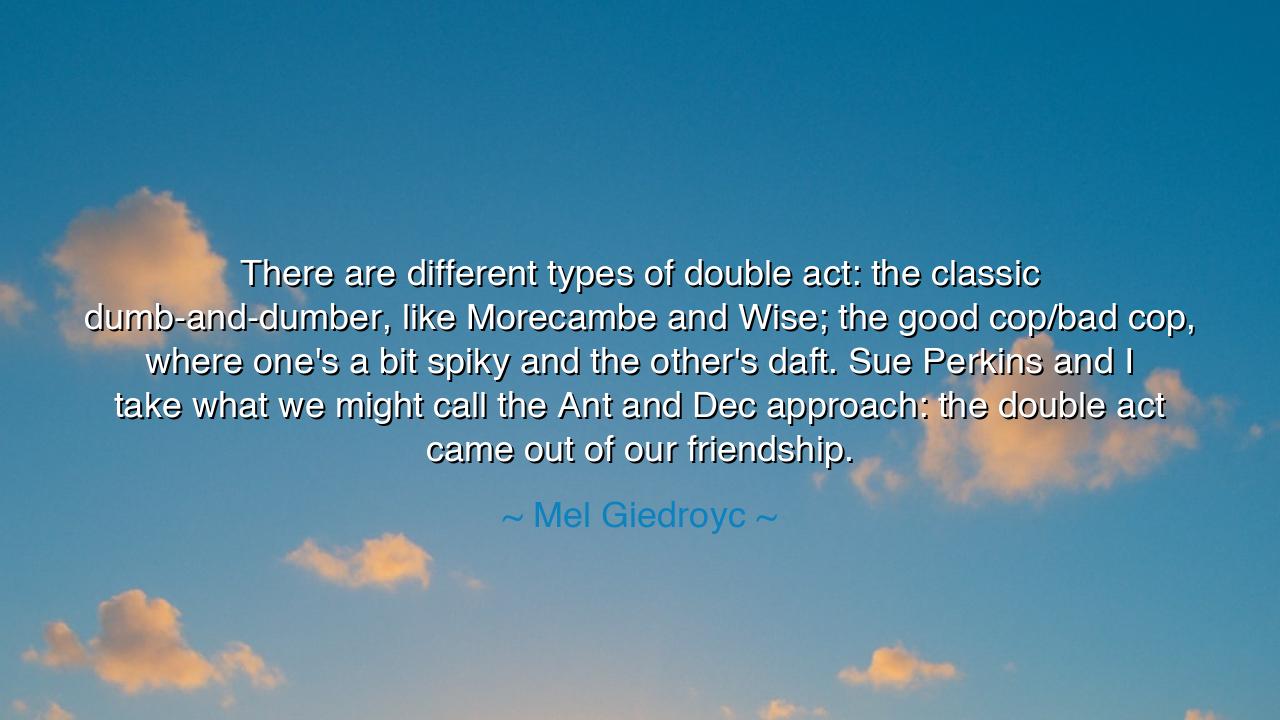
There are different types of double act: the classic
There are different types of double act: the classic dumb-and-dumber, like Morecambe and Wise; the good cop/bad cop, where one's a bit spiky and the other's daft. Sue Perkins and I take what we might call the Ant and Dec approach: the double act came out of our friendship.






"There are different types of double act: the classic dumb-and-dumber, like Morecambe and Wise; the good cop/bad cop, where one's a bit spiky and the other's daft. Sue Perkins and I take what we might call the Ant and Dec approach: the double act came out of our friendship." These words from Mel Giedroyc offer us a glimpse into the deeper nature of human connection and collaboration, where the bonds of friendship give birth to something greater than the sum of its parts. The double act—that harmonious pairing of two individuals who complement one another with skill, humor, and chemistry—has existed for centuries, taking many forms. Yet, as Giedroyc points out, the best and most enduring partnerships are not based solely on performance, but on a genuine connection—a shared friendship that fuels the magic they create together.
In the ancient world, the concept of a pairing—whether in the form of warriors, philosophers, or companions—was revered as a powerful force. The bonds between great leaders, such as Achilles and Patroclus, were not merely alliances formed for convenience or power; they were deep relationships that transcended the ordinary, creating a partnership that was inseparable in both battle and in life. Achilles, the mightiest of warriors, was not fully complete without Patroclus at his side. Their shared bond was more than mere companionship; it was the foundation of their greatest achievements. Giedroyc’s reflection on the Ant and Dec approach mirrors this timeless idea: when two people share a deep connection, the resulting partnership is not only more effective, but it also becomes something sacred, transcending performance into a lasting legacy of friendship and unity.
The history of famous double acts is filled with stories of individuals whose personal connection shaped their professional success. Consider Morecambe and Wise, the iconic British comedy duo. Their humor was built on a contrast—the straight man and the fool—but their success was not just in the delivery of their routines; it was in the trust they placed in one another. Their friendship allowed them to play off each other in a way that felt effortless, a chemistry that only those deeply connected could achieve. Just as the ancients believed that true power came from those who shared an intimate understanding, so too did Morecambe and Wise find their power in the deep friendship that lay at the heart of their act.
Similarly, in the case of Sue Perkins and Mel Giedroyc, their collaboration is built not on mere comedic timing but on a profound sense of shared history and mutual respect. Their friendship is the very foundation of their success, as it is not based on one being “better” or “smarter” than the other, but on the equality and balance they share. Giedroyc’s words echo a powerful truth: when people connect on a level deeper than the superficial, when they trust each other in a way that transcends competition, their combined energy can create something that resonates with others on an emotional level. This is the magic of a true partnership, one that is not just about filling roles, but about coming together as equals in pursuit of a shared goal.
Let us, therefore, turn our gaze to the lessons embedded in these double acts. What do they teach us? At their core, they show that friendship is not only about mutual affection, but about the way two souls can intertwine to create something greater than they could ever achieve alone. Friendship, in this sense, becomes the catalyst for greatness. It is the foundation upon which true success—whether in art, business, or life—is built. This idea, so vividly illustrated by Giedroyc, reminds us that the most enduring partnerships are those where both individuals give freely, where there is no competition, only a shared commitment to one another’s success and happiness.
In the context of our own lives, let us not underestimate the power of friendship when it comes to collaboration. Whether we are working with a colleague, a partner, or a friend, the most powerful connections are those rooted in genuine understanding and trust. If we hope to create something meaningful, we must look to those with whom we share a deep bond. Let us strive to form relationships that are not based on superficial roles but on an authentic connection. For in that connection, we will find the strength to create, the courage to take risks, and the support to persevere when times are hard.
Therefore, as Mel Giedroyc teaches us through her own experience, we must seek out true friendships—relationships that allow us to build not just careers or performances, but legacies that endure. In our own partnerships, let us honor the strength of the bond between us, knowing that it is through that unity—be it in laughter, work, or life—that we can achieve greatness together. Let us walk together as equals, side by side, not merely as collaborators but as true friends, for it is only in such partnerships that we can create something truly lasting.






AAdministratorAdministrator
Welcome, honored guests. Please leave a comment, we will respond soon